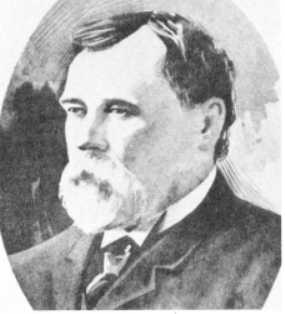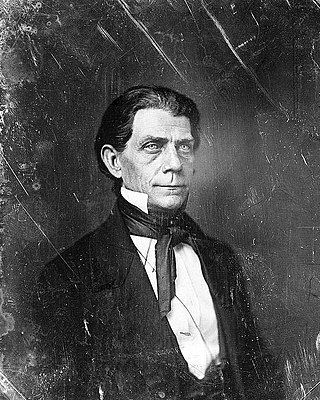
Edward Livingston was an American jurist, statesman and slaveholder. He was an influential figure in the drafting of the Louisiana Civil Code of 1825, a civil code based largely on the Napoleonic Code. Livingston represented both New York and then Louisiana in Congress and served as the U.S. Secretary of State from 1831 to 1833 and Minister to France from 1833 to 1835 under President Andrew Jackson. He was also the 46th mayor of New York City.

William Bradford was a lawyer and judge from Philadelphia, Pennsylvania, and the second United States Attorney General in 1794–1795.

Coles Bashford was an American lawyer and politician who became the fifth governor of Wisconsin, and one of the founders of the U.S. Republican Party. His one term as governor ended in a bribery scandal that ended in him fleeing Wisconsin, but he was later instrumental in the government of the newly formed Arizona Territory.

Thomas Mitchell Campbell was the 24th Governor of Texas, serving two terms from 1907 to 1911. He was an attorney and businessman, working as a manager for the International-Great Northern Railroad before entering politics from Palestine, Texas.

James Alfred Pearce was an American politician. He was a member of the U.S. House of Representatives, representing the second district of Maryland from 1835 to 1839 and 1841 to 1843. He later served as a U.S. Senator from Maryland from 1843 until his death in 1862.

A law enforcement officer (LEO),, or police officer or peace officer in North American English, is a public-sector or private-sector employee whose duties primarily involve the enforcement of laws, protecting life & property, keeping the peace, and other public safety related duties. Law enforcement officers are designated certain powers & authority by law to allow them to carry out their responsibilities.

John Robert Baylor was a US Indian agent, publisher and editor, politician, and a senior officer of the Confederate States Army. After being dismissed as Indian agent, he became one of the founding editors of The White Man, a newspaper in North Texas, and a strong critic of Governor Sam Houston.

James Harvey Slater was a United States representative and Senator from Oregon. An Illinois native, Slater also served in the Oregon Territory's Legislature, then later the Oregon State Legislature, and was the owner of the Corvallis Union newspaper.

The government of Texas operates under the Constitution of Texas and consists of a unitary democratic state government operating under a presidential system that uses the Dillon Rule, as well as governments at the county and municipal levels.
Constantine W. Buckley was an American politician in Texas who served two non-consecutive terms as Speaker of the Texas House of Representatives between 1861 and 1863.

The Texas attorney general is the chief legal officer of the U.S. state of Texas. The current officeholder, Republican Angela Colmenero, has been appointed to the position on July 10, 2023 by Governor Greg Abbott. She serves instead of Ken Paxton, who has been impeached and suspended without salary while awaiting trial in the Texas Senate.

David Browning Culberson was a Confederate soldier, a Democratic U.S. Representative from Texas and Chairman of the House Judiciary Committee.

Asa Hoxie Willie was a United States representative representing Texas and chief justice of the Texas Supreme Court. During the Civil War, he served as a major in the Confederate Army. Willie was elected as a Democrat to one term in Congress from 1873 to 1875 as an at-large member.

Memucan Hunt was the first Minister of Texas to the United States, Secretary of the Texas Navy, and an unsuccessful candidate for Vice-President of the Republic of Texas.

Martin McNulty Crane was an American attorney and politician. He was a Democratic, Granger movement, and Populist politician in the state of Texas, and held various positions in the state government. When he was state senator, he was a prominent formulator and proponent of the Railroad Commission Law that created the Railroad Commission of Texas. During his tenure as Attorney General of Texas, Crane brought and won the first antitrust suit in the history of Texas against the Waters-Pierce Oil Company.
The law of Texas is derived from the Constitution of Texas and consists of several levels, including constitutional, statutory, regulatory law, as well as case law and local laws and regulations.

John ColvinKnox was a Pennsylvania lawyer and judge. He served as an associate justice of the state Supreme Court and a term as state Attorney General.
The Texas Penal Code is the principal criminal code of the U.S. state of Texas. It was originally enacted in 1856 and underwent substantial revision in 1973, with the passage of the Revised Penal Code, in large part based on the American Law Institute's Model Penal Code.















